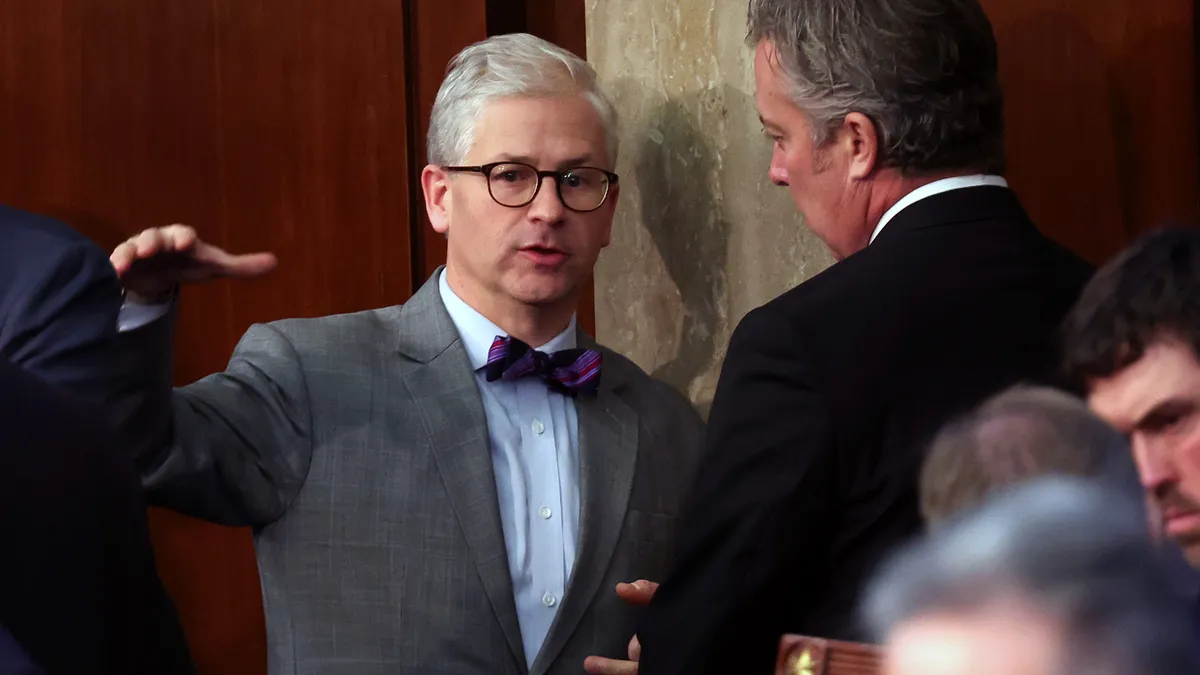House Financial Services Committee Chairman Patrick McHenry, R-NC, announced Tuesday that he will not run for reelection and plans to retire at the end of his term in 2025.
“I will be retiring from Congress at the end of my current term. This is not a decision I come to lightly, but I believe there is a season for everything and — for me — this season has come to an end,” McHenry said in a statement.
The departure of McHenry will raise questions surrounding committee leadership succession, bipartisan cooperation and the impact of digital asset policy.
Over his nearly 20-year House tenure, McHenry briefly assumed House leadership earlier this year when Republicans struggled to unify behind a speaker nominee after former speaker Rep. Kevin McCarthy, R-CA, was ousted from his role.
McHenry's decision to leave has sparked questions about the future of the House and the potential candidate to take the helm of the Financial Services Committee.
“There has been a great deal of handwringing and ink spilled about the future of this institution because some — like me — have decided to leave. Those concerns are exaggerated. I've seen a lot of change over twenty years,” he said. “I truly feel this institution is on the verge of the next great turn. Whether it's 1974, 1994, or 2010, we've seen the House evolve over time. Evolutions are often lumpy and disjointed, but at each stage, new leaders emerge. There are many smart and capable members who remain, and others are on their way. I'm confident the House is in good hands.”
It is unlikely that McHenry would have sought to run another term as chairman of the Financial Services Committee if he remained in Congress as per the rules of the GOP caucus. According to the rule, House Republicans are limited to a maximum of six consecutive years as chairman or ranking minority member of a committee. McHenry has performed in one of the other roles for the past five years.
Rep. French Hill, R-AR, who is a senior panel member with a commercial banking background, expressed interest while speaking on Bloomberg TV.
“I’ve spent 40 years in that arena, both in the capital markets and in commercial banking,” Hill said. “And if my colleagues wanted me to take on that task, that’d be great.”
However, Republican House Committee chairs and ranking members are chosen by a steering committee so seniority will not likely play a role in deciding the next leader.
McHenry's exit could be a big blow to the crypto industry since the lawmaker backed legislation that would give crypto trading platforms a more favorable set of rules than the existing ones. However, most Democrats are skeptical about passing the bill following FTX's high-profile bankruptcy and federal enforcement actions on cryptocurrency trading platforms like Coinbase, Binance and Kraken. McHenry's crypto legislation, which has yet to pass the House, faces opposition from Senate Banking Chairman Sherrod Brown, D-OH.
McHenry has taken a dig at the Consumer Financial Protection Bureau and its director Rohit Chopra, saying it can expect stricter oversight under the next Congress' GOP-led House as Republicans continue to try to rein in an agency they claim has become too powerful.
McHenry played a crucial role as a negotiator among House Republicans. Earlier this year, he helped negotiate over the debt ceiling and avert a government shutdown in the fall.
He was the youngest member of Congress when he started his journey at 29. He transformed from a partisan firebrand into a prominent consensus builder working along party lines. McHenry used to text and call Republicans, asking them to choose their sides ahead of tough votes in the House.
“He used to frustrate the living daylights out of me,” former House Majority Leader Steny Hoyer, D-MD, told The Wall Street Journal in 2015. “He and I now have a very good relationship, but we started out pretty rocky. I used to be thinking, ‘This young kid is a pain in the neck.’”
McHenry went against several House Republicans when he voted to certify President Joe Biden's electoral victory in 2021.














